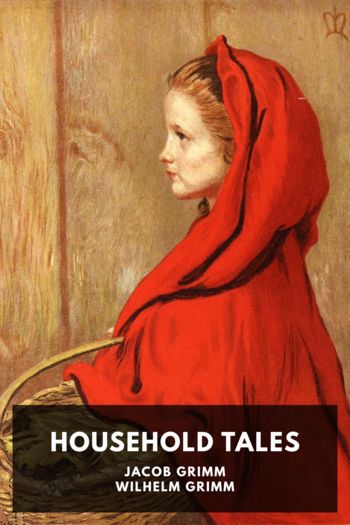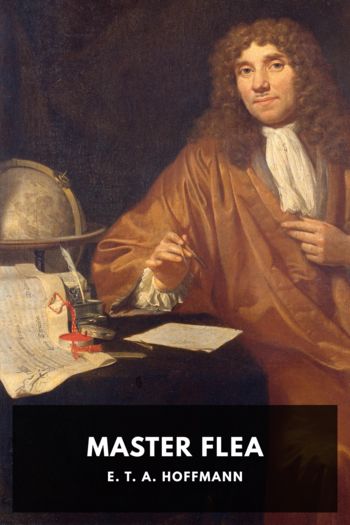Household Tales - Jacob Grimm (read me a book .txt) 📗

- Author: Jacob Grimm
Book online «Household Tales - Jacob Grimm (read me a book .txt) 📗». Author Jacob Grimm
“But that was only a taste, I must have more.” She did not dare to oppose him, and went and put a huge cauldron full of food on the fire, and when it was ready, carried it in. “At length come a few crumbs,” said he, and ate all there was, but it was still not sufficient to appease his hunger. Then said he, “Father, I see well that with you I shall never have food enough; if you will get me an iron staff which is strong, and which I cannot break against my knees, I will go out into the world.” The farmer was glad, put his two horses in his cart, and fetched from the smith a staff so large and thick, that the two horses could only just bring it away. The youth laid it across his knees, and snap! he broke it in two in the middle like a beanstalk, and threw it away. The father then harnessed four horses, and brought a bar which was so long and thick, that the four horses could only just drag it. The son snapped this also in twain against his knees, threw it away, and said, “Father, this can be of no use to me, you must harness more horses, and bring a stronger staff.” So the father harnessed eight horses, and brought one which was so long and thick, that the eight horses could only just carry it. When the son took it in his hand, he broke off a bit from the top of it also, and said, “Father, I see that you will not be able to procure me any such staff as I want, I will remain no longer with you.”
So he went away, and gave out that he was a smith’s apprentice. He arrived at a village, wherein lived a smith who was a greedy fellow, who never did a kindness to anyone, but wanted everything for himself. The youth went into the smithy and asked if he needed a journeyman. “Yes,” said the smith, and looked at him, and thought, “That is a strong fellow who will strike out well, and earn his bread.” So he asked, “How much wages dost thou want?”
“I don’t want any at all,” he replied, “only every fortnight, when the other journeymen are paid, I will give thee two blows, and thou must bear them.” The miser was heartily satisfied, and thought he would thus save much money. Next morning, the strange journeyman was to begin to work, but when the master brought the glowing bar, and the youth struck his first blow, the iron flew asunder, and the anvil sank so deep into the earth, that there was no bringing it out again.
Then the miser grew angry, and said, “Oh, but I can’t make any use of you, you strike far too powerfully; what will you have for the one blow?”
Then said he, “I will only give you quite a small blow, that’s all.” And he raised his foot, and gave him such a kick that he flew away over four loads of hay. Then he sought out the thickest iron bar in the smithy for himself, took it as a stick in his hand and went onwards.
When he had walked for some time, he came to a small farm, and asked the bailiff if he did not require a head-servant. “Yes,” said the bailiff, “I can make use of one; you look a strong fellow who can do something, how much a year do you want as wages?” He again replied that he wanted no wages at all, but that every year he would give him three blows, which he must bear. Then the bailiff was satisfied, for he, too, was a covetous fellow.
Next morning all the servants were to go into the wood, and the others were already up, but the head-servant was still in bed. Then one of them called to him, “Get up, it is time; we are going into the wood, and thou must go with us.”
“Ah,” said he quite roughly and surlily, “you may just go, then; I shall be back again before any of you.” Then the others went to the bailiff, and told him that the headman was still lying in bed, and would not go into the wood with them. The bailiff said they were to awaken him again, and tell him to harness the horses. The headman, however, said as before, “Just go there, I shall be back again before any of you.” And then he stayed in bed two hours longer. At length he arose from the feathers, but first he got himself two bushels of peas from the loft, made himself some broth with them, ate it at his leisure, and when that was done, went and harnessed the horses, and drove into the wood. Not far from the wood was a ravine through which he had to pass, so he first drove the horses on, and then stopped them, and went behind the cart, took trees and brushwood, and made a great barricade, so that no horse could get through. When he was entering the wood, the others were just driving out of it with their loaded carts to go home; then said he to them, “Drive on, I will still get home before you do.” He did not drive far into the wood, but at once tore two of the very largest trees of all out of the earth, threw them on his cart, and turned round. When he came to the barricade, the others were still standing there, not able to get through. “Don’t you see,” said he, “that if you had stayed with me, you would have got home just as quickly, and would have had another hour’s sleep?” He now wanted to drive on, but his horses could not work their way through, so he unharnessed them, laid





Comments (0)